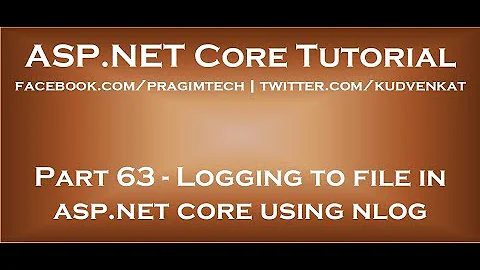Adding properties to log message in NLog in .net core
Solution 1
If you want custom layout properties (NLog calls them layout renderers) you can use the EventProperties Layout Renderer. You can simply do this in your code:
var logger = LogManager.GetCurrentClassLogger();
var eventInfo = new LogEventInfo(LogLevel.Info, logger.Name, "Message");
eventInfo.Properties["CustomValue"] = "My custom string";
eventInfo.Properties["CustomDateTimeValue"] = new DateTime(2020, 10, 30, 11, 26, 50);
// You can also add them like this:
eventInfo.Properties.Add("CustomNumber", 42);
// Send to Log
logger.Log(eventInfo);
Then you will be able to add these (any any properties you make up) in your nlog.config
<target>
<parameter name="@customtime" layout="${event-properties:CustomDateTimeValue:format=yyyy-MM-dd HH\:mm\:ss}" />
<parameter name="@customvalue" layout="${event-properties:item=CustomValue}" />
<parameter name="@customnumber" layout="${event-properties:item=CustomNumber}" />
</target>
When using NLog with AspNetCore, it's useful to add the NLog.Web Package for ASP.NET Core which gives you many predefined Layout renderers. You can find more about NLog.Web for AspNetCore on their Github page.
This AspNetCore package will give you things like the following:
<parameter name="@UserName" layout="${aspnet-user-identity}" />
<parameter name="@MvcAction" layout="${aspnet-MVC-Action}" />
<parameter name="@Session" layout="${aspnet-session:Variable=User.Name:EvaluateAsNestedProperties=true}" />
... etc
You will find the complete list on the NLog.Web.AspNetCore Github page.
Solution 2
NLog can integrate with Microsoft ILogger, and will capture messsage-template properties:
logger.LogInformation("Message {PropertyName}", "PropertyValue");
It has been supported since NLog.Extensions.Logging ver. 1.0 in combination with NLog ver. 4.5.
More advanced examples of working with Microsoft ILogger can be found here:
https://github.com/NLog/NLog.Extensions.Logging/wiki/NLog-properties-with-Microsoft-Extension-Logging
Notice that one is not required to use Microsoft ILogger when developing a NetCore-application. NLog Logger ver. 4.5 works without any issues on both .NetFramework- and .NetCore-applications. See also https://github.com/NLog/NLog/wiki/How-to-use-structured-logging
Solution 3
Find step by step information to setup Nlog in your .NET Application.
Step 1:- Installation
Install NLog and NLog.Extended of version 4.0.0.0 from Nuget Manager.
Step 2:- WebConfig configuration
<configSections>
<section name="nlog" type="NLog.Config.ConfigSectionHandler, NLog" />
</configSections>
<nlog xmlns="http://www.nlog-project.org/schemas/NLog.xsd" xmlns:xsi="http://www.w3.org/2001/XMLSchema-instance" autoReload="true" throwExceptions="false" internalLogFile="D:\NLogErrors\log.txt">
<extensions>
<!-- load NLog.Extended to enable ASP.NET-specific functionality -->
<add assembly="NLog.Extended" />
</extensions>
<!--Define Various Log Targets like files, database or asp.net trace files-->
<targets>
<target name="oracle" xsi:type="Database" keepConnection="false" dbProvider="Oracle.DataAccess.Client.OracleConnection, Oracle.DataAccess, Version=4.121.1.0, Culture=neutral, PublicKeyToken=89b483f429c47342" connectionString="Data Source=(DESCRIPTION =(ADDRESS = (PROTOCOL = TCP)(HOST = "" )(PORT = 1521))(CONNECT_DATA =(SID = "")));User Id="";Password="";" commandText="INSERT INTO LOGTABLE (LOGMESSAGE,LOGLEVEL,LOGGERNAME,CREATEDDATETIME,SESSIONID,BROWSERDETAIL,REQUESTURL,ERRORMESSAGE,PRODUCERCODE,QUOTENO,CUSTOMER_IP_ADDRESS,SERVER_IP_ADDRESS) values(:LOGMESSAGE,:LOGLEVEL,:LOGGERNAME,:CREATEDDATETIME,:SESSIONID,:BROWSERDETAIL,:REQUESTURL,:ERRORMESSAGE,:PRODUCERCODE,:QUOTENO,:CUSTOMER_IP_ADDRESS,:SERVER_IP_ADDRESS)">
<parameter name="LOGMESSAGE" layout="${message}" />
<parameter name="LOGLEVEL" layout="${level:uppercase=true}" />
<parameter name="LOGGERNAME" layout="${logger}" />
<parameter name="CREATEDDATETIME" layout="${date}" />
<parameter name="SESSIONID" layout="${event-context:item=SessionId}" />
<parameter name="BROWSERDETAIL" layout="${event-context:item=BrowserDetail}" />
<parameter name="REQUESTURL" layout="${event-context:item=RequestUrl}" />
<parameter name="ERRORMESSAGE" layout="${event-context:item=ErrorMessage}" />
<parameter name="PRODUCERCODE" layout="${event-context:item=ProducerCode}" />
<parameter name="QUOTENO" layout="${event-context:item=QuoteNo}" />
<parameter name="CUSTOMER_IP_ADDRESS" layout="${event-context:item=CUSTOMER_IP_ADDRESS}"/>
<parameter name="SERVER_IP_ADDRESS" layout="${event-context:item=SERVER_IP_ADDRESS}"/>
</target>
<target xsi:type="Mail" name="Email" html="true" addNewLines="false" replaceNewlineWithBrTagInHtml="false" subject="Error Log" to="[email protected]" useSystemNetMailSettings="true" body="${event-context:item=EmailBody}">
</target>
</targets>
<rules>
<logger name="*" minlevel="trace" writeTo="oracle" />
</rules>
</nlog>
Step 3:- Cs Code
public static class NLogManager
{
public static ILogger _logger =
NLog.LogManager.GetCurrentClassLogger();
public static void InfoLog(NLogData nLogData)
{
LogEventInfo theEvent = new LogEventInfo(LogLevel.Info, NLogManager._logger.Name, nLogData.Message);
SetLogEventInfo(theEvent, nLogData);
_logger.Log(theEvent);
}
}
private static void SetLogEventInfo(LogEventInfo theEvent, NLogData
nLogData)
{
theEvent.Properties["SessionId"] = nLogData.SessionId;
theEvent.Properties["BrowserDetail"] = nLogData.BrowserDetail;
theEvent.Properties["RequestUrl"] = nLogData.RequestUrl;
theEvent.Properties["ErrorMessage"] = nLogData.ErrorMessage;
theEvent.Properties["EmailBody"] = nLogData.EmailBody;
theEvent.Properties["ProducerCode"] = nLogData.ProducerCode;
theEvent.Properties["QuoteNo"] = nLogData.QuoteNo;
theEvent.Properties["CUSTOMER_IP_ADDRESS"] = nLogData.CustomerIPAddress;
theEvent.Properties["SERVER_IP_ADDRESS"] = nLogData.ServerIPAddress;
}
Step 4:- Model Entity
public class NLogData
{
public string SessionId { get; set; }
public string Message { get; set; }
public string RequestUrl { get; set; }
public string BrowserDetail { get; set; }
public string Method { get; set; }
public string ErrorMessage { get; set; }
public string EmailBody { get; set; }
public string ProducerCode { get; set; }
public string QuoteNo { get; set; }
public string CustomerIPAddress { get; set; }
public string ServerIPAddress { get; set; }
}
Step 5 :- Add Below line from where you have implement logging
NLogManager.TraceLog(NLogData nlogData);
-- Create proper format which is accepted by above method and set value accordingly
If you have any query please leave comment or mail me on [email protected]
Related videos on Youtube
Purnima Naik
Updated on September 15, 2022Comments
-
 Purnima Naik over 1 year
Purnima Naik over 1 yearI am using
NLogfor logging messages in .net core.I have added
NLoginStartUp.csas follows:loggerFactory.AddNLog();For logging to file, I am using following method:
logger.LogInformation("Message");I want to add custom NLog event properties to my message. But LogInformation() is not allowing me to pass that. How can I do that?
-
 BaBu over 6 yearsTnx! (Sorry to admit I can't get any of the alternatives to work though... The first two possibly because I use NLog.Web.AspNetCore, but then I have to in order to get NLog to work with .NET Core, yes? Your third option, the 'MyLogEvent' class doesn't compile.)
BaBu over 6 yearsTnx! (Sorry to admit I can't get any of the alternatives to work though... The first two possibly because I use NLog.Web.AspNetCore, but then I have to in order to get NLog to work with .NET Core, yes? Your third option, the 'MyLogEvent' class doesn't compile.) -
 BaBu over 6 yearsedit: the MyLogEvent class compiles fine, I'm an idiot. But the {$event-properties} renderer still doesn't pick up the illusive properties.
BaBu over 6 yearsedit: the MyLogEvent class compiles fine, I'm an idiot. But the {$event-properties} renderer still doesn't pick up the illusive properties. -
 BaBu over 6 yearsabout versions: I'm using NLog.Web.AspNetCore (4.4.1) which seems to include NLog (5.0.0-beta07) and NLog.Extensions.Logging (1.0.0-rtm-beta5). So, I should be ok. But it won't work.
BaBu over 6 yearsabout versions: I'm using NLog.Web.AspNetCore (4.4.1) which seems to include NLog (5.0.0-beta07) and NLog.Extensions.Logging (1.0.0-rtm-beta5). So, I should be ok. But it won't work. -
 Rolf Kristensen over 6 yearsI know it is confusing, but NLog 5.0 BETA is stale and only useful for UWP10 application. The latest version is NLog 4.5 RC
Rolf Kristensen over 6 yearsI know it is confusing, but NLog 5.0 BETA is stale and only useful for UWP10 application. The latest version is NLog 4.5 RC -
 Rolf Kristensen over 6 yearsYou should instead use NLog.Extensions.Logging ver. 1.0.0-rtm-rc2 with NLog 4.5 RC
Rolf Kristensen over 6 yearsYou should instead use NLog.Extensions.Logging ver. 1.0.0-rtm-rc2 with NLog 4.5 RC -
 BaBu over 6 yearsThing is; the doc for NLog.Extensions.Logging says "ASP.NET Core users should use the ASP.NET Core 2 tutorial" and that page says "Needs NLog.Web.AspNetCore". So, can I use either? What's the difference between them? Anyway, I'm awarding you the bounty for your efforts. Tnx.
BaBu over 6 yearsThing is; the doc for NLog.Extensions.Logging says "ASP.NET Core users should use the ASP.NET Core 2 tutorial" and that page says "Needs NLog.Web.AspNetCore". So, can I use either? What's the difference between them? Anyway, I'm awarding you the bounty for your efforts. Tnx. -
 Rolf Kristensen over 6 yearsNLog.Web.AspNetCore depends on NLog.Extensions.Logging, and adds some extra layout-renders that are useful when creating an Asp.NetCore application. When using NLog.Web.AspNetCore 4.5.0, then it will open access to the new stuff described in the above wiki-page.
Rolf Kristensen over 6 yearsNLog.Web.AspNetCore depends on NLog.Extensions.Logging, and adds some extra layout-renders that are useful when creating an Asp.NetCore application. When using NLog.Web.AspNetCore 4.5.0, then it will open access to the new stuff described in the above wiki-page. -
 Rolf Kristensen over 6 yearsI have created github.com/NLog/NLog.Extensions.Logging/pull/171, so all logic available in Asp.NetCore2 is also available for Net461.
Rolf Kristensen over 6 yearsI have created github.com/NLog/NLog.Extensions.Logging/pull/171, so all logic available in Asp.NetCore2 is also available for Net461. -
 BaBu over 6 yearsUpgraded to NLog.Web.AspNetCore 4.5.0-beta04. That solved this issue. So, it can be closed by the thread starter. (Be warned however; there may still be some small glitches in this beta (e.g. github.com/NLog/NLog.Web/issues/234,) but I'm sure they will smooth out)
BaBu over 6 yearsUpgraded to NLog.Web.AspNetCore 4.5.0-beta04. That solved this issue. So, it can be closed by the thread starter. (Be warned however; there may still be some small glitches in this beta (e.g. github.com/NLog/NLog.Web/issues/234,) but I'm sure they will smooth out)






